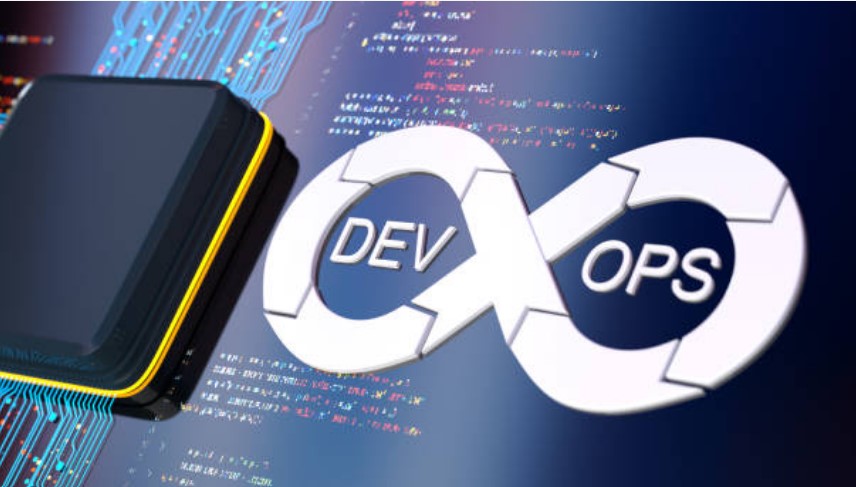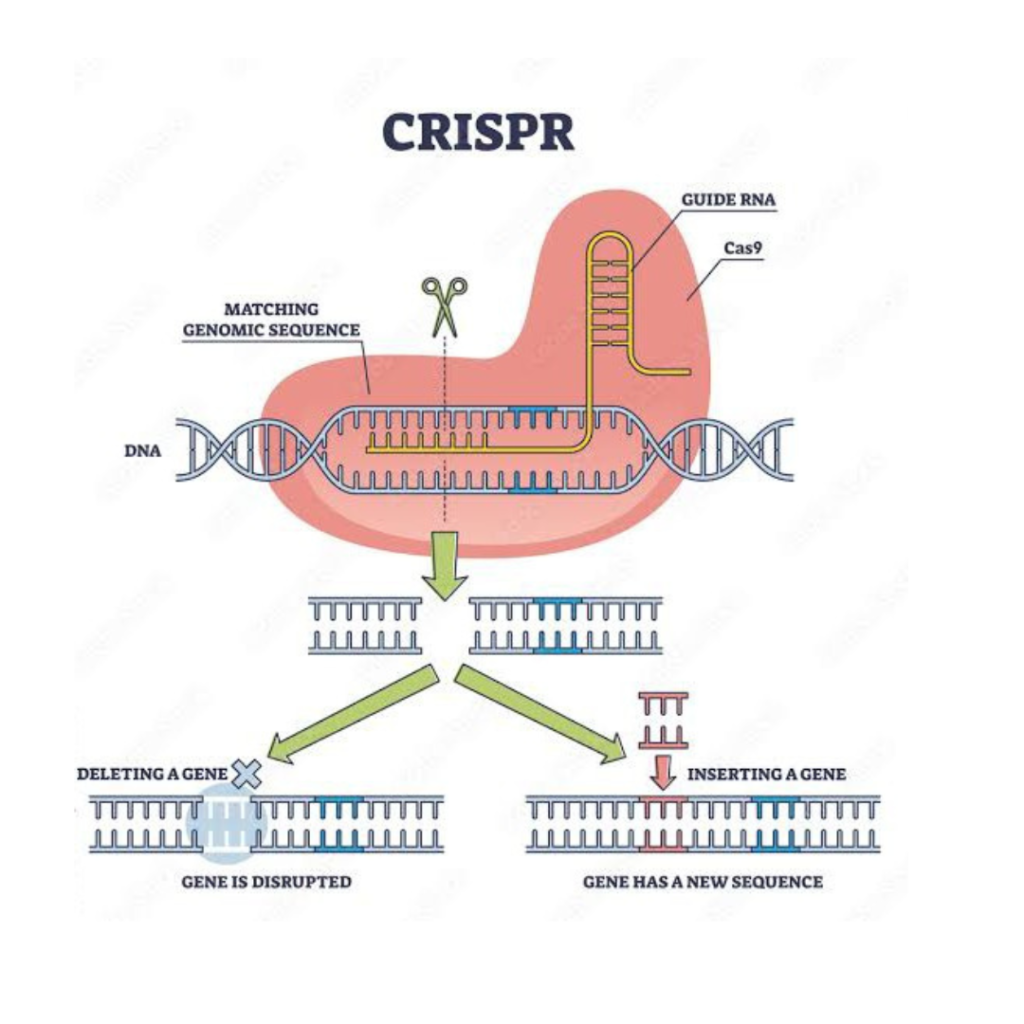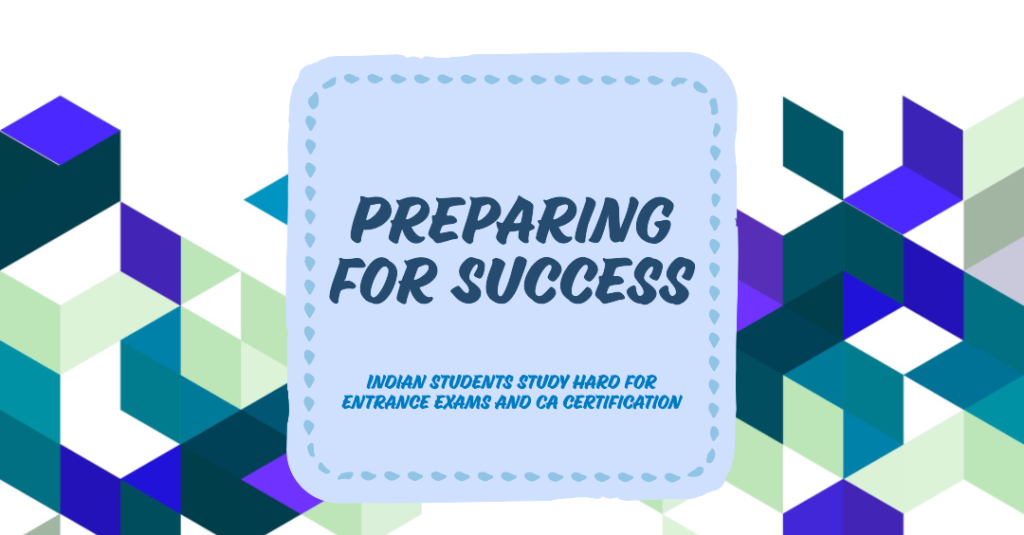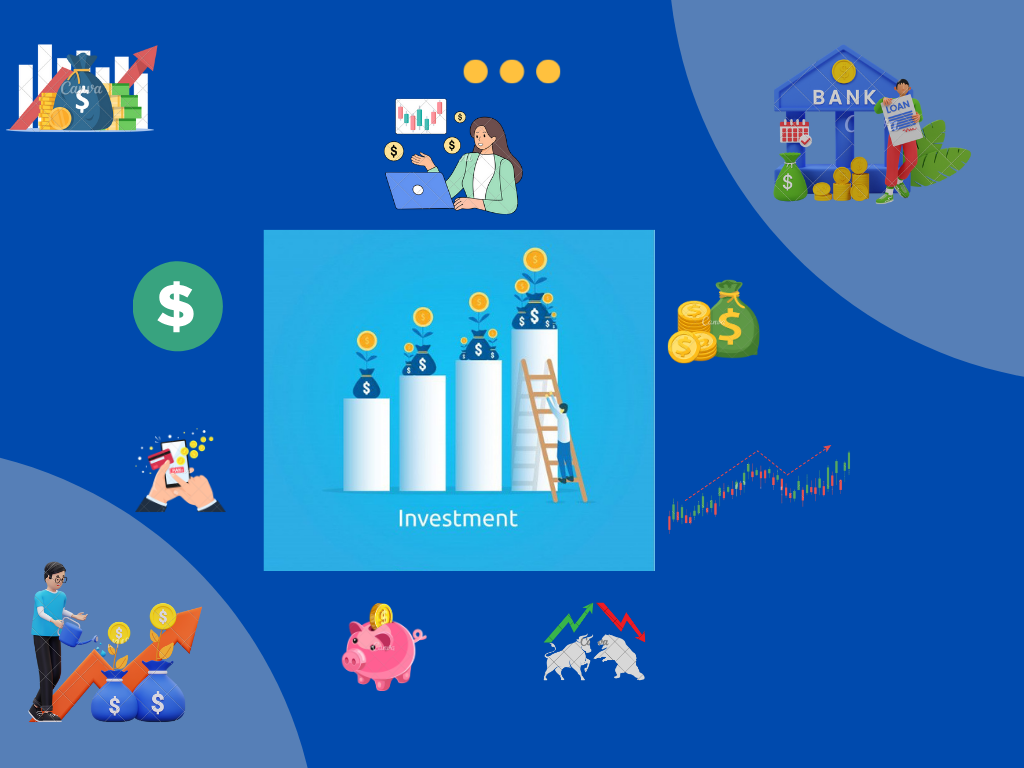Introduction
In today’s rapidly evolving tech landscape, DevOps has emerged as a robust methodology that bridges the gap between software development and IT operations. This innovative approach has revolutionized how software is built, tested, and deployed and has created many opportunities for individuals seeking a rewarding career. In this comprehensive guide, we’ll delve into DevOps as a career, exploring its significance, roles, required skills, and how to embark on a successful DevOps journey.
- The Significance of DevOps
- Roles in the DevOps Ecosystem
- The Must-Have DevOps Skills for Tech Professionals
- Getting Started on Your DevOps Journey
- Your Education Path to Becoming a DevOps Engineer
- The Daily Grind of a DevOps Engineer: Tasks and Responsibilities
- Strategies for Continuous Improvement in DevOps Engineering
- Career path for an entry-level DevOps engineer
- How is AI affecting the job of a DevOps Engineer?
- FAQs about DevOps Engineer as a Career:
The Significance of DevOps
DevOps, short for Development and Operations, is a culture that emphasizes collaboration, communication, and integration between software developers and IT operations professionals. It aims to automate and streamline the software development lifecycle, enabling faster delivery of high-quality applications. The seamless coordination between the development, testing, and deployment phases reduces errors, enhances efficiency, and fosters continuous improvement.
Roles in the DevOps Ecosystem
- DevOps Engineer: The backbone of any DevOps team, these professionals design, implement, and manage the infrastructure, tools, and processes required for seamless integration and deployment.
- Release Manager: Responsible for planning and overseeing software releases, ensuring that they meet quality standards and are delivered on time.
- Automation Architect: Designs and implements automated pipelines for building, testing, and deploying applications, reducing manual interventions and increasing efficiency.
- Continuous Integration/Continuous Deployment (CI/CD) Specialist: Focuses on creating and maintaining the CI/CD pipelines, which automate the delivery process, from code changes to production.
- Site Reliability Engineer (SRE): Ensures the reliability and stability of applications by blending aspects of software engineering with IT operations.
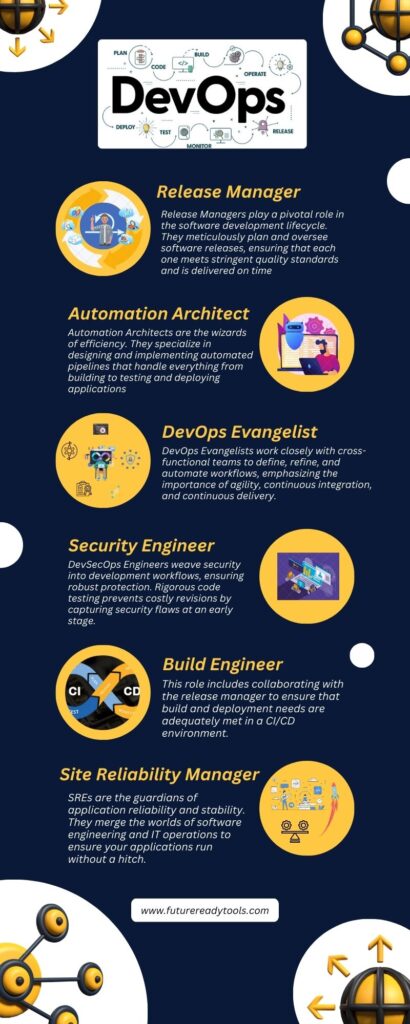
The Must-Have DevOps Skills for Tech Professionals
- Coding and Scripting: Proficiency in languages like Python, Ruby, and PowerShell enables the automation of tasks and the creation of infrastructure as code.
- Cloud Platforms: Familiarity with cloud providers like AWS, Azure, and Google Cloud is crucial for scalable and flexible infrastructure.
- Containerization: Understanding container technologies like Docker and orchestration tools like Kubernetes simplifies deployment across different environments.
- Version Control: Proficiency in tools like Git enables efficient collaboration among team members and efficient code management.
- Monitoring and Logging: Skill in tools like Prometheus and ELK stack allows for real-time monitoring and effective troubleshooting.
- Security Practices: Knowledge of security best practices ensures that applications and infrastructure are protected from vulnerabilities.
Getting Started on Your DevOps Journey
- Education and Training: Begin by acquiring a strong foundation in software development and IT operations. Online courses like those offered by Udemy, Coursera, and edX can provide structured learning paths.
- Certifications: Earning certifications like AWS Certified DevOps Engineer, Certified Kubernetes Administrator, or Certified Jenkins Engineer can validate your expertise and make your resume stand out.
- Hands-on Experience: Set up personal projects or contribute to open-source projects to gain practical experience and showcase your skills.
- Networking: Join DevOps communities, attend meetups, and engage in online forums to connect with professionals and stay updated on industry trends.
- Internships and Entry-Level Positions: Consider starting as a junior DevOps engineer or a related role to gain valuable industry experience.
Your Education Path to Becoming a DevOps Engineer
1. Foundational Education:
High School: Lay a strong foundation by excelling in mathematics, computer science, and related subjects. Developing problem-solving and critical thinking skills early on will benefit your future endeavors.
2. Bachelor’s Degree:
A bachelor’s degree in a relevant field provides a solid academic background. While there’s no specific degree requirement for becoming a DevOps engineer, degrees in Computer Science, Software Engineering, Information Technology, or a related discipline are common. Here’s what you can focus on during your undergraduate studies:
- Programming Languages: Learn programming languages like Python, Java, Ruby, and others commonly used in software development and automation.
- Operating Systems: Gain a deep understanding of various operating systems, including Linux and Windows.
- Networking: Acquire knowledge of networking concepts, protocols, and configurations.
- Databases: Familiarize yourself with database management systems, both SQL and NoSQL.
- Version Control: Learn to use version control systems like Git to manage code changes effectively.
- Software Development: Understand software development methodologies, including Agile and Scrum.
- Web Technologies: Get a grasp of web technologies such as HTML, CSS, and JavaScript.
3. Online Courses and Certifications:
While pursuing a formal degree, you can supplement your education with online courses and certifications. These resources can help you acquire specialized skills and demonstrate your expertise to potential employers:
- DevOps Fundamentals: Enroll in courses that cover DevOps principles, practices, and culture. Platforms like Udemy, Coursera, edX, and LinkedIn Learning offer relevant courses.
- Cloud Platforms: Gain proficiency in cloud platforms like AWS, Azure, and Google Cloud through certified courses. AWS Certified DevOps Engineer, Microsoft Certified: Azure DevOps Engineer, and Google Cloud Professional DevOps Engineer are valuable certifications.
- Containerization and Orchestration: Learn about Docker and Kubernetes, as they are integral to modern DevOps practices. Certified Kubernetes Administrator (CKA) and Docker Certified Associate are recognized certifications.
- Continuous Integration/Continuous Deployment (CI/CD): Acquire expertise in CI/CD tools like Jenkins, GitLab CI/CD, and Travis CI. Jenkins Certified Engineer is a notable certification.

4. Practical Experience:
Learning by doing is essential in the DevOps field. Apply theoretical knowledge to real-world projects:
- Personal Projects: Set up personal projects to practice implementing DevOps practices. For instance, create a website and automate its deployment pipeline.
- Open-Source Contributions: Contribute to open-source projects related to DevOps tools and practices. This not only enhances your skills but also showcases your commitment to the community.
5. Internships and Entry-Level Positions:
Upon completing your education and gaining some practical experience, consider internships or entry-level positions:
- Junior DevOps Engineer: These roles allow you to work under experienced DevOps engineers and learn from their expertise.
6. Advanced Education (Optional):
While not mandatory, pursuing a master’s degree or specialized certifications can boost your career:
- Master’s Degree: Consider a master’s in Computer Science, Software Engineering, or a related field to deepen your knowledge.
- Advanced Certifications: Pursue advanced certifications in specialized areas like cloud architecture, security, or automation.
7. Continuous Learning:
DevOps is a rapidly evolving field. Stay updated by:
- Reading: Regularly read blogs, articles, and books related to DevOps, cloud computing, and emerging technologies.
- Conferences and Meetups: Attend industry conferences, webinars, and local meetups to network and learn from experts.
Remember that the path to becoming a DevOps engineer is a continuous journey. The field demands adaptability, a willingness to learn, and the ability to apply new technologies to solve complex problems. By combining formal education, hands-on experience, certifications, and ongoing learning, you’ll be well-equipped to thrive as a DevOps engineer.
The Daily Grind of a DevOps Engineer: Tasks and Responsibilities

1. Morning Routine and Planning:
- Start the day by reviewing emails, messages, and any critical notifications from the previous night.
- Check the status of ongoing tasks and projects to prioritize activities for the day.
- Participate in a team stand-up meeting to discuss the progress, challenges, and goals for the day. Collaborate with developers, testers, and other team members to align on tasks.
2. Infrastructure and Automation:
- Work on infrastructure as code (IaC) tasks. Use tools like Terraform or CloudFormation to provision and manage infrastructure on cloud platforms.
- Review and enhance existing automation scripts and pipelines. Identify opportunities for optimization and increased efficiency.
3. Continuous Integration and Deployment (CI/CD):
- Monitor the CI/CD pipelines to ensure smooth code integration, testing, and deployment.
- Troubleshoot any pipeline failures, addressing issues related to build errors, test failures, or deployment problems.
- Collaborate with development teams to improve the pipeline’s reliability and performance.
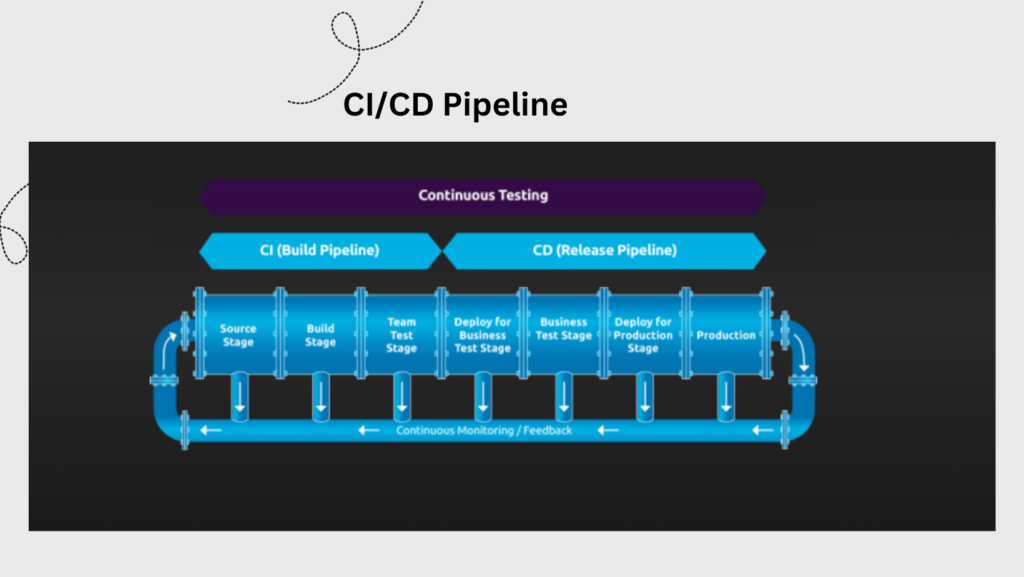
4. Monitoring and Incident Response:
- Check monitoring and logging systems for any anomalies or alerts. Ensure the health and performance of applications and infrastructure.
- Respond to incidents promptly. Investigate and resolve issues that might impact system stability or user experience.
- Collaborate with the Site Reliability Engineering (SRE) team to address incidents and implement preventive measures.
5. Infrastructure Scaling and Optimization:
- Analyze resource utilization and plan for scalability. Scale resources up or down based on traffic patterns and usage demands.
- Optimize system performance by fine-tuning configurations, identifying bottlenecks, and implementing load balancing.
6. Security and Compliance:
- Review security configurations and patches. Ensure that systems are up to date and meet security compliance standards.
- Collaborate with security teams to implement best practices and measures to protect applications and data.
7. Collaboration and Communication:
- Engage in discussions with development, operations, and QA teams to ensure smooth collaboration and alignment of goals.
- Update documentation for processes, configurations, and troubleshooting steps to facilitate knowledge sharing within the team.
8. Learning and Skill Enhancement:
- Dedicate time to learning about new tools, technologies, and industry trends. DevOps is an evolving field, and staying updated is crucial.
- Experiment with new tools and approaches in a sandbox environment to explore their potential benefits.
9. Afternoon Review and Planning:
- Review progress made during the day, address any pending tasks, and ensure that the team is on track to meet project goals.
- Plan for the next day by prioritizing tasks, setting goals, and identifying any potential challenges.
10. Continuous Improvement:
- Participate in retrospective meetings to discuss what went well, what could be improved, and action items for process enhancement.
- Collaborate with the team to implement improvements based on feedback and insights gathered from retrospectives.
11. Off-hours Responsibilities:
- Depending on the organization’s policies, DevOps engineers might be on-call for a certain period. During off-hours, they should be ready to respond to critical incidents and ensure system availability.
12. Wrap-up and Reflection:
- Before signing off for the day, ensure that all tasks are well-documented, and communication is clear with team members about ongoing tasks.
- Reflect on the day’s accomplishments, challenges, and lessons learned.
A DevOps engineer’s day is characterized by a blend of technical tasks, collaboration, problem-solving, and continuous learning. Flexibility and adaptability are key traits as the role often requires quickly switching between tasks and addressing unexpected challenges. Overall, the role is rewarding, offering the opportunity to influence the software development lifecycle, enhance system reliability, and contribute to the organization’s success.
Strategies for Continuous Improvement in DevOps Engineering

Here are some common challenges and strategies to tackle them:
1. Cultural Shift: Challenge: Transitioning to a DevOps culture requires changes in mindset and practices across teams, which can meet resistance from traditional siloed approaches.
Solution: DevOps engineers can foster a culture of collaboration by:
- Advocating for open communication between development and operations teams.
- Organizing cross-functional workshops to share knowledge and build relationships.
- Demonstrating the value of collaboration through successful project outcomes.
2. Automation Complexities: Challenge: Implementing and maintaining complex automation pipelines can lead to challenges in scripting, integration, and scaling.
Solution: DevOps engineers can address this challenge by:
- Following best practices for writing clean, modular, and maintainable scripts.
- Using version control systems to track changes and manage scripts effectively.
- Implementing testing for automation code to catch errors early and ensure reliability.

3. Tool Selection and Integration: Challenge: Choosing the right tools for each stage of the CI/CD pipeline can be overwhelming, and integrating them seamlessly can be challenging.
Solution: DevOps engineers can navigate this challenge by:
- Evaluating tools based on their compatibility with existing systems and team requirements.
- Prioritizing tools that have strong community support and active development.
- Designing a well-structured pipeline architecture that accommodates tool integration and scalability.
4. Security Concerns: Challenge: Ensuring the security of applications and data throughout the DevOps process is a critical challenge, as increased automation can potentially expose vulnerabilities.
Solution: DevOps engineers can address security concerns by:
- Incorporating security practices from the early stages of the development lifecycle.
- Regularly scanning code and infrastructure for vulnerabilities and implementing necessary fixes.
- Collaborating closely with security teams to implement secure configurations and access controls.

5. Scaling Infrastructure: Challenge: As applications grow, scaling infrastructure to handle increased traffic and demand can be complex and resource-intensive.
Solution: DevOps engineers can handle scalability challenges by:
- Implementing cloud-based infrastructure solutions that allow for flexible scaling.
- Using containerization and orchestration tools to manage resources efficiently.
- Monitoring system performance and usage patterns to predict and plan for scaling needs.
6. Continuous Monitoring and Maintenance: Challenge: Ensuring the ongoing performance, reliability, and security of applications requires continuous monitoring and maintenance.
Solution: DevOps engineers can manage this challenge by:
- Setting up monitoring tools to track key performance metrics and receive alerts for anomalies.
- Implementing automated testing and continuous integration practices to catch and address issues early.
- Regularly reviewing logs and metrics to identify trends and proactively address potential problems.
7. Communication and Collaboration: Challenge: Collaboration between development, operations, and other teams can be hindered by communication gaps and misaligned priorities.
Solution: DevOps engineers can promote effective communication by:
- Participating in regular cross-functional meetings to share progress and challenges.
- Encouraging the use of collaboration tools, such as shared documentation and communication platforms.
- Actively seeking input from team members and stakeholders to ensure alignment on goals.
8. Technical Debt: Challenge: Rushing to meet deployment deadlines can lead to accumulating technical debt, making future changes and improvements more challenging.
Solution: DevOps engineers can manage technical debt by:
- Balancing speed with quality to ensure that deployments are stable and maintainable.
- Prioritizing refactoring and continuous improvement alongside feature development.
- Regularly revisiting code and automation scripts to address technical debt systematically.
Tackling these challenges requires a combination of technical expertise, effective communication, collaboration, and a commitment to continuous learning. DevOps engineers play a pivotal role in driving positive change within organizations by overcoming these obstacles and ensuring the successful adoption of DevOps practices.
Career path for an entry-level DevOps engineer
Here’s a typical trajectory that an entry-level DevOps engineer might follow:
1. Junior DevOps Engineer:
- Role: As a junior DevOps engineer, you’ll work under the guidance of more experienced team members. You’ll focus on learning the fundamentals of DevOps practices, tools, and processes.
- Responsibilities: You’ll assist in building and maintaining infrastructure, setting up automation pipelines, and supporting ongoing deployments and monitoring.
- Learning: Gain hands-on experience with tools like Git, Jenkins, Docker, and basic cloud services. Learn to troubleshoot issues and collaborate with development and operations teams.
2. DevOps Engineer:
- Role: As you gain experience and confidence, you’ll transition into a full-fledged DevOps engineer role.
- Responsibilities: You’ll take on more complex tasks, design and implement advanced automation, improve existing pipelines, and contribute to strategic planning for DevOps initiatives.
- Learning: Deepen your knowledge of container orchestration tools like Kubernetes, advanced cloud services, and more sophisticated CI/CD practices.
3. Senior DevOps Engineer:
- Role: With a few years of experience, you’ll be promoted to a senior DevOps engineer role, where you’ll take on leadership responsibilities and mentor junior team members.
- Responsibilities: Lead larger projects, design high-availability solutions, architect complex infrastructure, and drive best practices throughout the organization.
- Learning: Develop expertise in security practices, advanced monitoring and observability, and strategies for optimizing scalability and performance.
4. DevOps Architect or Lead DevOps Engineer:
- Role: In this role, you’ll be responsible for designing and implementing DevOps strategies across the organization. You might lead a team of DevOps engineers or work closely with other engineering teams.
- Responsibilities: Architect and implement DevOps pipelines, automation frameworks, and infrastructure solutions. Collaborate with stakeholders to align DevOps practices with business goals.
- Learning: Deepen your understanding of software architecture, microservices, advanced networking concepts, and large-scale infrastructure design.
5. DevOps Manager or Director of DevOps:
- Role: As you progress in your career, you might move into management roles overseeing entire DevOps teams and strategies.
- Responsibilities: Lead and manage teams of DevOps engineers, set strategic goals, allocate resources, and ensure the successful implementation of DevOps practices across the organization.
- Learning: Develop strong leadership and communication skills, understand organizational dynamics, and stay updated on emerging technologies and industry trends.
6. Chief DevOps Officer (CDO) or VP of DevOps:
- Role: At the highest level of the career path, you might become a CDO or VP of DevOps, where you’ll have a significant impact on the organization’s technology strategy and direction.
- Responsibilities: Define and drive the overall DevOps vision, align it with business objectives, and ensure that DevOps practices contribute to innovation and growth.
- Learning: Focus on strategic planning, executive leadership skills, and staying at the forefront of technology trends and industry developments.
Throughout your career path, continuous learning, certifications, and staying up-to-date with the latest technologies and best practices are crucial. Networking, attending industry events, contributing to open-source projects, and seeking mentorship can also play a significant role in your growth as a DevOps professional. Remember that the career path can vary depending on factors such as the organization’s structure, industry, and individual aspirations.
How is AI affecting the job of a DevOps Engineer?
AI (Artificial Intelligence) is significantly impacting the job of a DevOps engineer by introducing new tools, automating repetitive tasks, enhancing decision-making, and reshaping the overall landscape of software development and IT operations.
Here’s how AI is affecting the role of a DevOps engineer:
1. Automation of Routine Tasks: AI-powered automation tools are streamlining and accelerating repetitive tasks in areas like code testing, deployment, monitoring, and infrastructure provisioning. DevOps engineers are now able to focus on more strategic and complex activities, rather than spending time on manual, mundane tasks.
2. Continuous Integration and Continuous Deployment (CI/CD): AI algorithms are being employed to optimize CI/CD pipelines by predicting code quality issues, identifying potential bottlenecks, and suggesting improvements. This not only accelerates the development process but also enhances the overall efficiency of the pipeline.
3. Predictive Analytics: AI-driven predictive analytics tools analyze historical data to predict potential issues, such as performance bottlenecks or security vulnerabilities. DevOps engineers can proactively address these issues before they escalate, leading to more reliable and resilient systems.
4. Monitoring and Incident Management: AI-enabled monitoring tools can quickly identify anomalies and patterns in system behavior. When an incident occurs, AI can assist in diagnosing the root cause and suggesting possible solutions, enabling faster incident resolution.
5. Capacity Planning and Scalability: AI algorithms can analyze usage patterns and predict future resource requirements. This aids DevOps engineers in effectively planning for scaling infrastructure and resources to meet demand.
6. Chatbots and Virtual Assistants: AI-powered chatbots and virtual assistants can provide real-time support to DevOps teams, answering queries, providing insights, and assisting in troubleshooting issues. This can enhance collaboration and reduce response times.
7. Security and Compliance: AI can bolster security by identifying unusual patterns that might indicate security breaches or unauthorized access. It can also help in compliance management by automating audits and ensuring adherence to industry regulations.
8. Skill Evolution: The advent of AI in DevOps requires engineers to acquire new skills in machine learning, data analytics, and algorithmic thinking. DevOps professionals may need to become adept at integrating AI tools into existing workflows.
9. Enhanced Decision-Making: AI-powered data analysis can provide DevOps engineers with deeper insights into system performance, user behavior, and potential optimization opportunities. This leads to more informed decision-making.
10. DevOps Culture Transformation: The implementation of AI technologies often necessitates a cultural shift, promoting collaboration and cross-functional knowledge-sharing among development, operations, and data science teams. DevOps engineers may find themselves working more closely with data scientists and AI specialists.
11. Job Evolution: AI is reshaping the roles and responsibilities of DevOps engineers. While routine tasks are automated, engineers are now focusing on tasks that require critical thinking, problem-solving, architectural design, and strategy development.
In summary, AI is augmenting the capabilities of DevOps engineers by introducing automation, predictive analytics, and advanced decision support. While AI is enhancing efficiency and reducing manual workloads, it also demands a continuous learning mindset as DevOps engineers adapt to new technologies, tools, and paradigms. Embracing AI within the DevOps context has the potential to drive innovation, improve system reliability, and contribute to more agile and responsive organizations.
If you are interested to know about other careers check out this website https://futurereadytools.com/
FAQs about DevOps Engineer as a Career:
- What is a DevOps engineer?
A. DevOps engineer is a professional who combines development and IT operations skills to streamline software development processes, enhance collaboration, and automate deployment, monitoring, and management tasks.
2. What skills are required to become a DevOps engineer?
A. DevOps engineers require skills in programming, version control, continuous integration/continuous deployment (CI/CD) pipelines, cloud platforms, automation, containerization (e.g., Docker), and configuration management tools.
3. What are the benefits of adopting DevOps practices?
A. DevOps practices lead to faster development cycles, improved collaboration between teams, enhanced software quality, quicker issue resolution, and more efficient use of resources.
4. What is the role of automation in DevOps?
A. Automation is central to DevOps, as it helps eliminate manual, error-prone tasks, ensuring consistent deployments, configuration management, and testing. It improves efficiency and reduces human intervention.
5. How does DevOps relate to Agile development?
A. DevOps and Agile both emphasize iterative development and collaboration. DevOps focuses on the entire software lifecycle, including deployment and operations, while Agile primarily deals with development phases.
6. Which programming languages are important for DevOps engineers?
A. Common programming languages include Python, Ruby, JavaScript, and Bash scripting. The choice depends on the specific tools and tasks within your DevOps environment.
7. What are some popular DevOps tools?
A. Commonly used DevOps tools include Jenkins, Git, Docker, Kubernetes, Ansible, Terraform, and monitoring tools like Prometheus and Grafana.
8. What certifications can help advance a DevOps career?
A. Certifications such as AWS Certified DevOps Engineer, Certified Kubernetes Administrator (CKA), and DevOps Institute certifications can enhance your job prospects and skills.
9. Is cloud computing knowledge essential for DevOps?
A. Yes, cloud computing is crucial in modern DevOps environments. Familiarity with major cloud platforms like AWS, Azure, and Google Cloud is beneficial.
10. What is the typical career path for a DevOps engineer?
A. DevOps engineers often start as software developers, system administrators, or operations professionals. With experience, they transition into specialized DevOps roles, potentially moving into leadership positions like DevOps manager.

